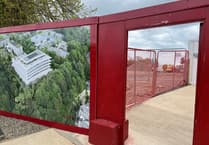More than £20m has been paid out so far in government funding support to businesses and workers affected by the Covid crisis.
Enterprise Minister Laurence Skelly gave the figure as he, alongside his department’s chief executive Mark Lewin and head of policy and strategy Andrew Stewart, gave evidence to an emergency scrutiny session of the Public Accounts Committee which is investigating the government’s response to the Covid crisis.
They were quizzed over the five support schemes operated by the Department for Enterprise, which between them paid out over £10m so far - and why some applications had been rejected.
Treasury operates the wage support scheme and the MERA benefit - taking the total paid out to more than £20m.
Mr Lewin said the business support scheme, which gives grants of £3,000, was always intended as narrow interim measure to provide a ’temporary bit of respite’ for the tourism industry in particular, pending other more general schemes coming forward.
’It was never intended as a long-term scheme,’ he said, adding that it had started out as an early response to those businesses which had suffered ’a catastrophic and immediate’ impact from the government’s closure orders.
Since then the scheme had been widened to included other sectors including the self-employed.
Some 99% of application have now been processed. But 230 out of the 3,200 applications processed so far had been declined for not being in an eligible sector. The total number declined is 677.
Others had been declined for tax status issues or had otherwise failed Treasury checks over the structure of the applicant’s business or insufficient National Insurance payments.
Committee member Jane Poole-Wilson gave the example of an osteophath who didn’t receive payment but a sports therapist who did after appealing.
’Why not make it open to all who can demonstrate loss of business?’ she asked.
Mr Lewin said now the department was on top of applications it was going back on those that had previously been rejected to check whether eligibility had changed. ’It is always under review,’ he said.
Committee members Chris Robertshaw and Julie Edge declared an interest at the start of the hearing. Mr Robertshaw said his business had been in receipt of the £3,000 business support scheme and the Treasury’s wage support scheme while Ms Edge said some family members had similar received the £3,000 grant and had applied to the salary support scheme.
Mr Robertshaw asked: ’What lesson do you think you’ve learned?
Mr Lewin said ’clarity was probably the biggest thing’. He said the helpine had been launched with all good intent but they had not foreseen the scale of what they would be dealing with.
The DfE’s helpline had initially been deluged by businesses seeking advice, the PAC heard.
Mr Lewin said every time the business support scheme was changed to include more sectors it became a little more complex.
Mr Robertshaw asked about the need for longer-term support given that the 2020 tourist season had effective been lost. Mr Lewin said: ’Clearly we aiming to do something completely diferent for a long-term basis.’




